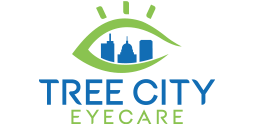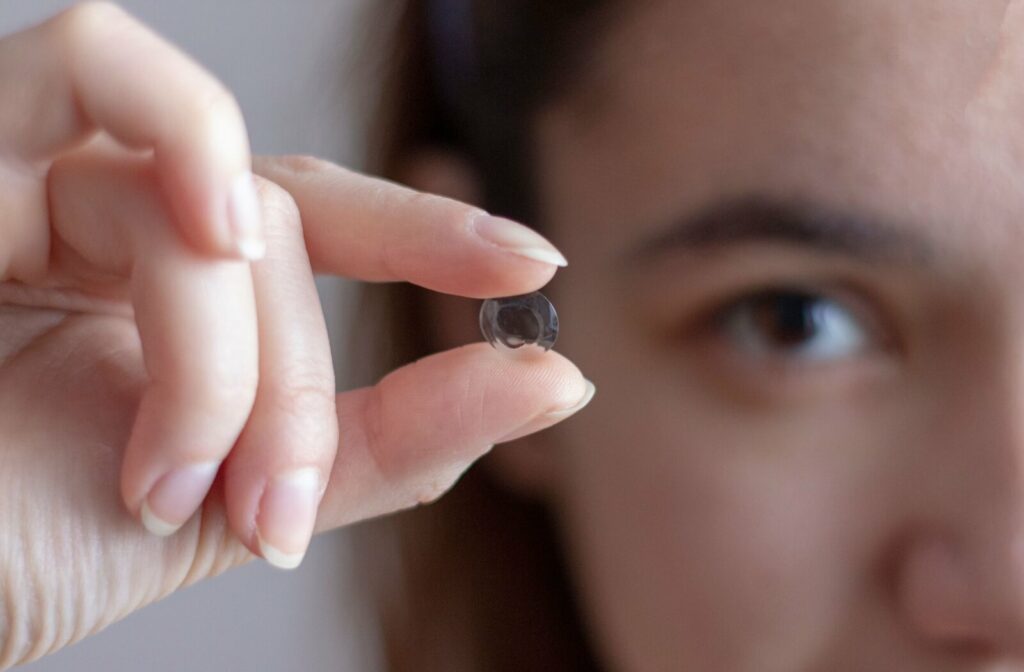If you’re one of millions of adults with myopia, you likely wear glasses or contact lenses almost daily. While these methods can be a convenient way to correct your vision, sometimes you may want freedom from day-time glasses or contact lenses. If this is the case, orthokeratology may be worth considering.
Like almost every treatment, orthokeratology has certain pros and cons. These rigid lenses temporarily reshape the eye while you sleep, allowing you to properly refract light and see without glasses or other contacts for the rest of the day. However, these results aren’t permanent, and it can take some time to adjust to the sensations.
What Is Myopia?
When your eye is shaped properly, light refracts through the cornea to converge on a single point at the back of the eye. This system lets you see the world around you—but it relies heavily on the shape of your eye. So what happens when the eye isn’t shaped properly?
If your eye grows too long, or the cornea curves incorrectly, the light rays don’t bend properly as they enter the eye. While you may be able to see nearby objects clearly, they’ll appear blurrier the further they get from your eye. This is myopia, an extremely common refractive error often called nearsightedness.
Fortunately, myopia is also easily treatable. If you’re living with this condition, you can use eyeglasses or contact lenses to alter light as it enters your eye, accommodating your natural refractive error to correct your vision.
But what if you don’t want to constantly worry about losing a contact lens or breaking your glasses? That’s when it helps to think about orthokeratology.
What Is Orthokeratology?
Orthokeratology, often called ortho-k, is a specialized, non-invasive way to treat myopia. This practice involves wearing custom specialty contact lenses overnight while you sleep. They gently reshape the cornea overnight, improving its ability to focus light.
Remember—myopia is a problem with the shape of the eye itself. Orthokeratology aims to counteract this issue, and it actually alters the cornea’s shape to refract light without the need for other types of vision correction.
Ortho-k lenses are custom-designed by your optometrist to apply the right amount and distribution of pressure to achieve the right corneal shape. They’re rigid and gas-permeable, meaning they allow oxygen to reach the cornea. This ensures healthy overnight wear.
Once you wake up, you remove the lenses. Your eye will be temporarily reshaped. The correction holds very nicely throughout the day, although your eye’s shape will slowly begin to revert to its natural elongation. Most patients wearing ortho-k notice excellent vision throughout the day; However, in some cases you may notice a bit of softening of vision as you get ready for sleep. You restart the cycle by re-inserting the lens before bed to provide clear vision tomorrow.
Failure to insert the lenses before bed may mean you won’t have clear vision the following day. Therefore, keeping a consistent schedule is key to this type of vision correction.
The Pros of Orthokeratology
Orthokeratology can be an excellent, non-invasive way to address your myopia. It’s particularly ideal for people who lead an active lifestyle. Whether you’re a tradesperson, an athlete, or simply enjoy being on the go, orthokeratology offers vision correction without the worry of losing or damaging your glasses or contacts.
However, it’s about more than just convenience. Orthokeratology, when worn by children, can play a significant role in reducing how far myopia progresses.
It’s an extremely effective type of myopia control. When used daily, it can slow myopia progression by almost 50%. This means that trying orthokeratology for children isn’t just about giving clear vision—orthokeratology can help avoid the long-term effects of severe myopia.
Whether you’re looking for a convenient alternative to glasses, or planning to invest in your child’s future vision, orthokeratology can be an excellent solution.
The Cons of Orthokeratology
While orthokeratology can be a wonderful approach to treating myopia, there are a few things to be aware of.
Firstly, it isn’t permanent. Toward the end of every day, your eyes will begin to revert to their natural shape. To maintain your results, you’ll need to wear the lenses every night (although some patients do well with every-other night wear). If you take a night off, you may need to switch back to your glasses or contacts. This may be a plus for those who prefer to avoid permanent alterations to their eyes by surgical procedures like LASIK.
Additionally, there may be some lens awareness the first few nights of wear. The lenses will be applying gentle amounts of pressure to the cornea as you sleep. Within a few nights, you’ll become comfortable with the nighttime lens wear.
It’s also important to note that orthokeratology isn’t a one-size-fits-all treatment for eye conditions – the lens design is customized for each patient. Before beginning this treatment, you’ll need to meet with your optometrist to determine if it could work for you. If you have other underlying conditions like keratoconus, high astigmatism, and others, orthokeratology may not be the right approach.
Should You Try Orthokeratology?
If you’re considering orthokeratology for you or your child, come see our team at Tree City Eyecare. We can examine your eyes and discuss potential options. Book an appointment with us, and take the first step towards clearer vision today!


